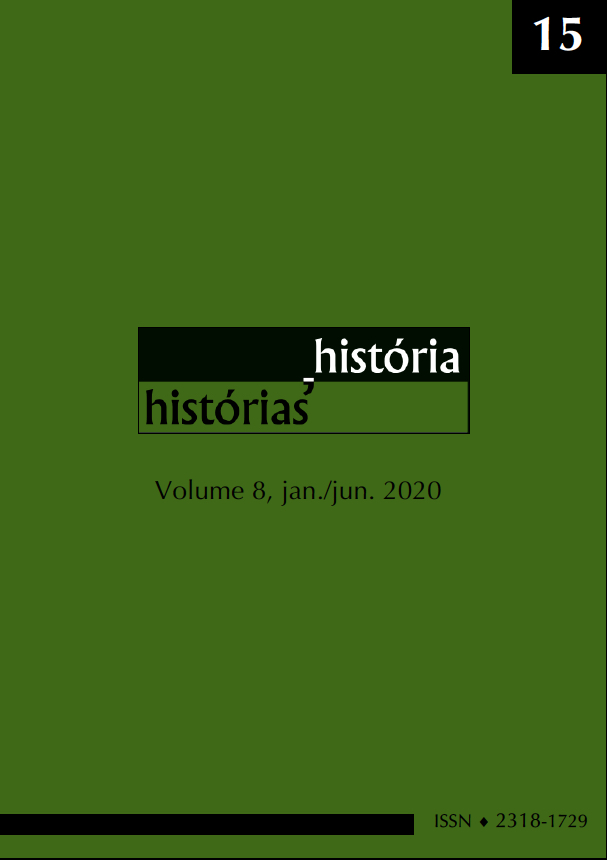Susan Sontag
Uma intelectual libertária/conservadora/radical nas Américas
DOI:
https://doi.org/10.26512/rhh.v8i15.26700Keywords:
Susan Sontag, América Latina, História, LiteraturaAbstract
Susan Sontag (1933-2004) was one of the most important North American public intellectuals of the twentieth century. Writer of novels and essays with dozens of translations, she has lived with expressive intellectuals and artists, including Latin Americans such as Carlos Fuentes, Octavio Paz and Julio Cortázar. In this way he sought to arouse the interest of many readers for the literary innovations produced in Latin America during the Cold War and how they were moved by the importance of thinking about political and social events resulting in an extremely instigating and difficult production to be found at the same time in the United States. This article aims to show how her relationship with some Latin American intellectuals has been established as well as to discuss the unfolding of its controversial political positions in relation with the U.S. foreign policy and the revolutionary experiences in Latin America.
Downloads
References
ARENDT, Hannah. The cold war and the west. New York: Parisan Review, 1962, pp.11-20.
BELLAH, Robert N. Habits of the Heart: Individualism and Commitment in American Life. Berkeley: University of California Press, 1995.
BLOOM, Alexander. Prodigal sons: the New York Intellectuals & Their World. New York: Oxford University Press, 1986.
CÁNDIDA SMITH, Richard. “‘Romper lo que está resquebrajado’: 1968 in the United States of America”. Cuadernos de Historia Contemporánea (Madrid), 31 (2009), pp.135-148.
CÁNDIDA SMITH, Richard. Improvised Continent. Panamericanism and Cultural Exchange. Philadelphia: University of Pennsylvania, 2017.
COCBURN, Alexander. Stone, Glass Houses, Sontag, and Saïd. April 5, 2001 Disponível em: https://www.thenation.com/article/stones-glass-houses-sontag-and-said/ Acesso em: 20/03/2008.
CORTÁZAR, Julio. Clases de literatura: Berkeley, 1980. Buenos Aires: Alfaguara, 2014.
CORTÁZAR, Julio. Fantomas contra los vampiros multinacionales. México, 1975.
CHOMSKI, Noam. The responsibility of Intellectuals. New York: The New York Press, 2017.
DUCAN, Robert. The homosexual in society. Politics, I, 7, August 1944.
FUENTES, Carlos. El linguaje del valor. Disponível em: https://elpais.com/diario/2004/12/29/cultura/1104274804_850215.html Acesso em: 03/06/2018.
FOX, Margalit. Susan Sontag, Social critic with verve, dies at 71. 29/12/2004 Disponível em: http://www.nytimes.com/2004/12/29/books/susan-sontag-social-critic-with-verve-dies-at-71.html Acesso em: 02/03/2018.
GOODMAN, Paul. Growing Up absurd. Problems of youth in the organized system. New York: Random House, 1960.
HABERKI, Ray. Susan Sontag and the 9/11 Haze. Disponível em: https://s-usih.org/2011/09/susan-sontag-and-911-haze/ Acesso em: 02/09/2017.
KAPLAN, Alice. Dreaming in French: The Paris Years of Jacqueline Bouvier Kennedy, Susan Sontag, and Angela Davis. Chicago: University of Chicago Press, 2012.
LOPATE, Philip. Notes on Sontag. Princeton: Princeton University Press, 2009.
MITRANO, Mena. In the archive of longing: Susan Sontag´s critical modernism. Edinburgh: Edinburgh University Press, 2016.
MOSER, Bejamin. Susan Sontag: Vida e obra. São Paulo: Companhia das Letras, 2019.
PONIATOWSKA, Elena. Susan Sontag, entrevista de Elena Poniatowska, México, 2004. Disponível em: http://escritorasunidas.blogspot.com/2011/02/susan-sontag-entrevista-de-elena.html Acesso em: 03/05/2018.
RIEFF, David. Swimming in a sea of death. A son´s memoir. New York: Simon & Schuster, 2008.
RIVERO, Raul. Heberto Padilla: tiempo al tiempo. Encuentro de la Cultura Cubana, Madrid, Invierno de 2000/2001, no. 19, pp. 19-20.
SCHREIBER, Daniel. Susan Sontag: a biography. Illinois: Northwestern University Press, 2014.
SCOTT, Jonathan. Entrevista completa para a revista Rolling Stone. Belo Horizonte: Autêntica, 2015.
SONTAG, Susan. Against interpretation. And others essays. New York: Farrar, Straus and Giroux, 1966.
SONTAG, Susan. Some Thoughts on the Right Way (for us) to Love the Cuban Revolution. NY: Ramparts, 1969, p. 6-19.
SONTAG, Susan. The art of revolution: 96 Posters from Cuba. London: Pall Mall Press London Limited, 1970.
SONTAG, Susan. Third world of women. Partisan Review: New York, vol. 40, n. 2, 1973, pp. 86-201.
SONTAG, Susan. Conversation with Susan Sontag. Jackson: University Press of Mississippi, 1995.
SONTAG, Susan. Under the sign of Saturn. New York: Farrar. Strauss. Giroux, 1980.
SONTAG, Susan. Ao mesmo tempo. São Paulo: Companhia das Letras, 2008.
SONTAG, Susan. A vontade radical. São Paulo: Companhia das Letras, 2015.
SONTAG, Susan. Diários II. Susan Sontag ”“ 1964-1980. São Paulo: Companhia das Letras, 2016.
SONTAG, Susan. Literature is freedom. Connecticut: Winterhouse Editions, 2003.
STAROBIN, Joseph R. American communism in crisis: 1943-1957. Cambridge, Mass: Harvard University Press, 1972.
WALD, Alan W. The New York Intellectuals: The rise and decline of the anti-Stalinist left from the 1930’s to the 1980’s. New York: University of Carolina Press, 1987.
WALD, Alan W. American Night: the literature left in the Era of Cold War. New York: The University of Caroline Press, 2012.
WATER, Clay. Susan Sontag, the Times' Anti-American Essayist. TimesWatch.org. Disponível em http://archive.mrc.org/timeswatch/articles/2004/99.aspx Acesso em: 30/01/2018.
UCLA Library Special Collections, Charles E. Young Research Library.
Downloads
Published
How to Cite
Issue
Section
License
Authors who submit papers with this journal agree to the following terms:
a) Authors retain copyright and grant the journal right of first publication with the work simultaneously licensed under a Creative Commons Attribution License that allows others to share the work with an acknowledgement of the work's authorship and initial publication in this journal.
b) Authors are able to enter into separate, additional contractual arrangements for the non-exclusive distribution of the journal's published version of the work (e.g., post it to an institutional repository or publish it in a book), with an acknowledgement of its initial publication in this journal.
c) Authors are permitted and encouraged to post their work online (e.g., in institutional repositories or on their website) prior to and during the submission process, as it can lead to productive exchanges, as well as earlier and greater citation of published work.




